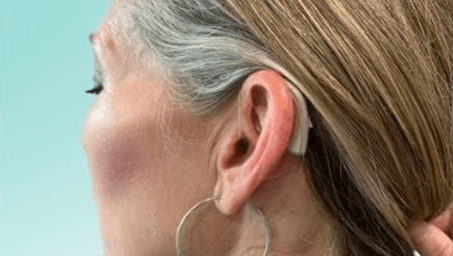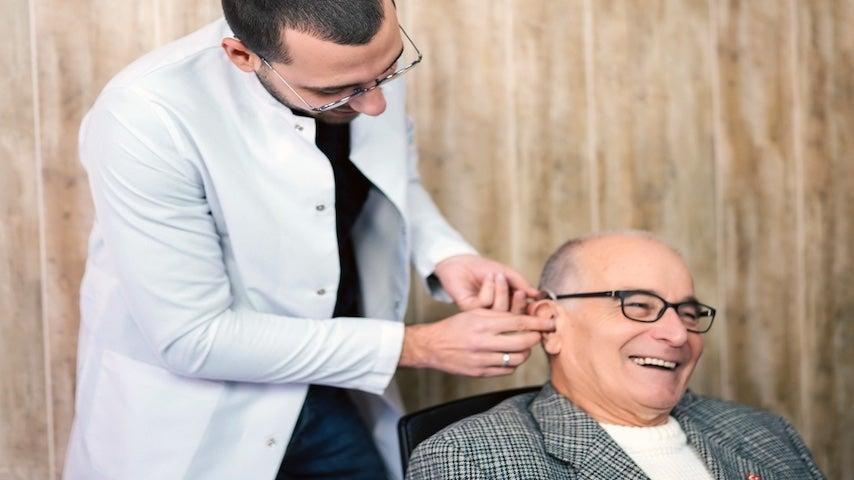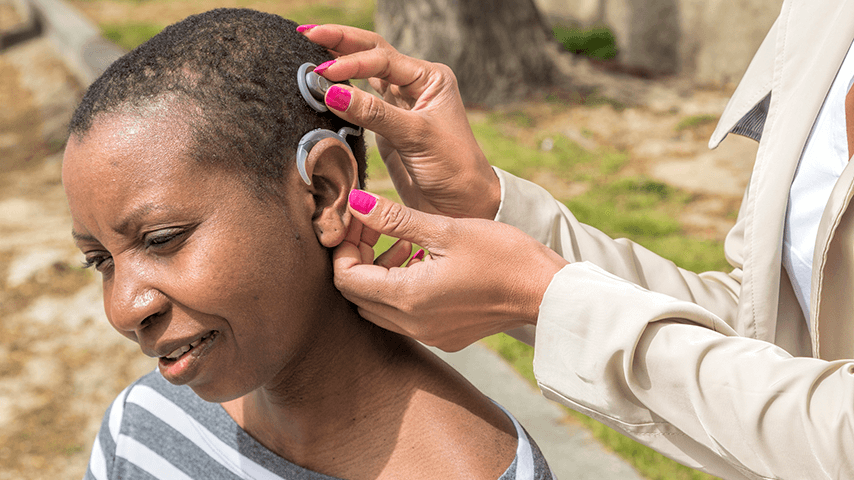Shopping for OTC Hearing Aids: How it Works, Where to Buy, and Other Buying Tips
8 min read

Related Topics
Hearing loss and aging often go hand-and-hand. So do hearing aids and high price tags.
Or do they?
Thanks to an FDA rule that went into effect in the fall of 2022, millions of Americans with mild to moderate hearing loss can now buy hearing aids over the counter (OTC)—which effectively slashed their expense. What once might have cost thousands of dollars in office visits, fittings, and equipment may run a small fraction of that today.
“The FDA recognized that these life-changing devices remained out of reach for too many people,” said Kathleen Cameron, former Senior Director of NCOA’s Center for Healthy Living. “This rule leveled the playing field a little bit by making it far easier and more affordable for people to get the hearing care they need and deserve.”
Yet many still haven’t taken advantage of the opportunity—simply because they don’t know how it works. Could you or someone you know be one of them?
In this handy FAQ, we’ll walk you through the who, where, and how to buy OTC hearing aids for the first time.
What was the FDA rule that made OTC hearing aids more accessible?
Many of us will experience some degree of hearing loss as we age. In fact, it’s one of the most common conditions affecting adults age 65 and over in the United States.1
But that doesn’t mean treatment has been equitable.
That’s because hearing aid manufacturers traditionally made their devices available exclusively through audiologists (hearing specialists), physician practices, or other specific outlets with a financial interest in selling them. Patients could only get hearing aids with a prescription, which required an initial exam and one or more follow-up visits to ensure proper fit and function.
“Together, this situation created unintended barriers,” said, Takuya Sakamoto, Head of Sony Electronics’ OTC Hearing Aids Business. “The burdens of time, travel, and price often were too great. Opening the doors for OTC hearing aids has allowed companies, like Sony, to make premium OTC Hearing Aid solutions more accessible to more people. People can now purchase at numerous retailers and find OTC hearing aid products with quality technology at a more affordable price. ”
On top of that, research suggests that people with untreated hearing loss have a greater risk for dementia, depression, heart attacks, and falls than those without hearing loss.2,3,4 This means that many adults already dealing with obstacles to hearing care also face other, related health disadvantages that affect their longevity and quality of life.
In October 2022, the U.S. Food & Drug Administration issued a final rule for OTC hearing aids intended to address some of these issues. Among other things, the rule removed third-party brokers and broadens access to safe, affordable, and effective hearing aid technology for millions of American adults.
Who can buy OTC hearing aids?
Anyone over age 18 with self-described mild to moderate hearing loss can buy hearing aids directly. Adults with a prescription for hearing aids can do the same.
“No one will ask you to ‘prove’ your level of hearing loss,” NCOA's Cameron said. “Even if it’s severe, you can buy your own hearing aids. But I would encourage anyone in this situation to think twice about OTC devices because you may be throwing your money away on something that won’t help you the way prescription hearing aids will.”
Of course, understanding your own level of hearing loss involves a degree of subjectivity, Cameron continued. If you generally pick up on most sounds, but sometimes have a hard time catching soft-spoken conversations, you likely have mild hearing impairment. If you regularly struggle to hear people who are speaking at a normal volume—especially in noisy places—you may have moderate hearing loss.
If you’re not sure about your level of hearing loss, there are online screeners, like the one from the American Speech-Language-Hearing Association, as well as other online hearing tests from companies like Sony. You may also read the labeling on any over-the-counter hearing aid you’re thinking about buying. As part of its new rule, the FDA does require manufacturers to describe common hearing loss symptoms to help you determine whether an OTC device is the right choice for you.
Do I need a prescription for over the counter hearing aids?
No, you don’t need a prescription—and you don’t need to see an audiologist before buying them, either.
But there are a few exceptions to know about. You can’t buy OTC hearing aids if you’re 18 or younger (although the FDA doesn’t ask retailers to verify age). And if your hearing loss is severe, some states may require you to see your doctor for a prescription first.5
“At Sony, we are big believers in making sure we get the right products in the right hands," Takuya Sakamonto said. "Sony's free online hearing assessment will let you know if you could be a candidate for our OTC hearing aids. While we know our OTC hearing aid products could be a great solution for people with perceived mild to moderate hearing loss, we know that they may not be the right fit for everyone. It is important for people to research the OTC hearing aid options out there and find the right products that suit their needs and lifestyle.”
If you’re concerned about your own or someone else’s hearing loss, it makes sense to get it checked by an ear, nose, and throat (ENT) physician or a licensed audiologist first—even if you plan to buy hearing aids over the counter. Doing so can help identify the type and degree of your hearing loss before you make a purchasing decision.
Can I buy an OTC hearing aid on my own?
Yes, you sure can. You can even purchase them for someone else. Simply visit a retailer in person or online and look for products that say both “OTC” and “hearing aid” on the packaging.
Where can I buy over the counter hearing aids?
Many online and traditional brick-and-mortar retailers now sell OTC hearing aids. These include pharmacies, wholesale clubs, electronics stores, and more, including (but not limited to):
- Best Buy
- Amazon
- BJ’s
- Costco
- CVS
- Walmart
And you still can get hearing aids from an audiologist if you prefer.
Is it safe to buy over the counter hearing aids?
In general, yes. But “buyer beware” does apply.
The FDA rule mandates that OTC hearing aids must sit a safe distance from the wearer’s ear drum and can’t exceed a certain volume. The devices also must include easy-to-use volume adjustments and clear labeling about how to wear and care for them.
However, as with any consumer product, there will always be companies making false claims—and scammers looking to make money on cheap knock-offs.
“Just because the FDA made this rule and set strict safety guidelines for manufacturers to follow, doesn’t mean that every product you find will be legitimate,” Cameron warned. “Still, many major, reputable brands have already entered this market. That means your choices for high-quality and safe hearing aids are pretty broad.”
Not sure where to start? Reading online reviews and asking other people about their experiences can help. Consider choosing hearing aids made by a company you already know and trust. And of course, be sure to ask about store return policies, manufacturer’s warranties, and any money-back guarantees before you make a purchase.
Does Medicare pay for hearing aids?
In most cases, no. Original Medicare (Parts A and B) does not cover the costs associated with getting hearing aids. That includes routine hearing tests, the devices themselves, and any fittings or adjustments afterwards.
Some private Medicare Advantage plans do include limited coverage for hearing aids. Be sure to check your plan documents or speak to your insurer to understand what your plan does and does not pay for.
The bottom line
In order to make hearing care more accessible and affordable for more Americans, the FDA authorized the sale of over-the-counter (OTC) hearing aids beginning in October 2022. Now, any adult age 18 or older can purchase these devices directly and without a prescription—so long as their perceived hearing loss is mild to moderate. In some cases, people with more severe hearing loss may also buy prescription hearing aids directly, but rules vary by state and may require a professional medical evaluation first.
As with any consumer purchase, it’s important to fully research the available options and ask about store return policies, money-back-guarantees, and manufacturer warrantees before you buy. While the average cost for over-the-counter hearing aids can be significantly cheaper than prescription models, they also tend to be less customizable and may not fit your ear or work as well as you’d like.
Also, keep in mind that Original Medicare currently does not cover hearing aids, whether they’re by prescription or not—so all costs come directly out of your own pocket. If you’re living with hearing loss and can’t afford hearing aids, there may be other resources to help.
Sources
1. National Institute on Aging. Hearing Loss: A Common Problem for Older Adults. Found on the internet at https://www.nia.nih.gov/health/hearing-and-hearing-loss/hearing-loss-common-problem-older-adults
2. David G. Loughrey, et al. Association of Age-Related Hearing Loss With Cognitive Function, Cognitive Impairment, and Dementia: A Systematic Review and Meta-analysis. JAMA Otolaryngology – Head & Neck Surgery. February 2018. Found on the internet at https://jamanetwork.com/journals/jamaotolaryngology/fullarticle/2665726
3. Frank R. Lin, MD, PhD, et. al. Hearing Loss and Cognitive Decline in Older Adults. JAMA Internal Medicine. February 25, 2013. Found on the internet at https://jamanetwork.com/journals/jamainternalmedicine/article-abstract/1558452
4. Gill Livingston, MD, et. al. Dementia prevention, intervention, and care: 2020 report of the Lancet Commission. The Lancet. August 8, 2020. Found on the internet at https://www.thelancet.com/journals/lancet/article/PIIS0140-6736(20)30367-6/fulltext
5. U.S. Food & Drug Administration. How to Get Hearing Aids. Found on the internet at https://www.fda.gov/medical-devices/hearing-aids/how-get-hearing-aids




